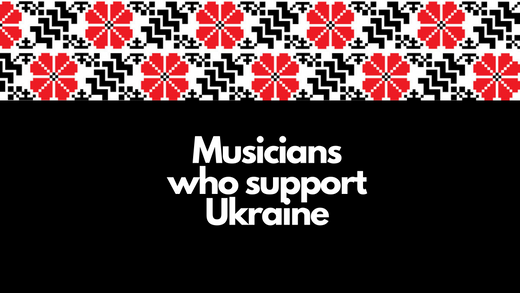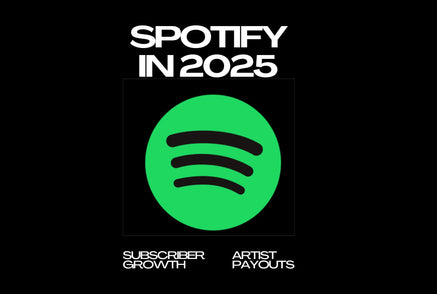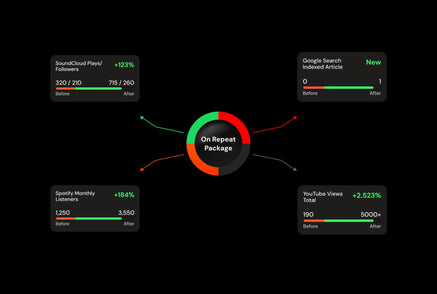Wartime Support for Ukraine Comes From World-Famous Musical Artists
The powerful and unyielding will of Ukrainians to resist the invaders from the russian federation has received worldwide public and cultural support.
The point is about tough, tenacious people refusing to put up with vladimir putin's recklessness and making every effort to stand up for their sovereign rights. But it is certainly not easy to keep up your morale under the threat of occupation, especially in situations where precision-guided ballistic missiles are incinerating civilians. However, in such cases, even music can be helpful - it may give people psychological aid temporarily.
There has never been an instance in the history of the world where so many different peoples have been able to unite so quickly to confront their enemy. When Putin invaded Ukraine, an overwhelming amount of the world immediately resonated and protested against such an invasion in various ways. As Ukrainians are outnumbered and outgunned, any demonstration of support is important.
These are the ways the music world has reacted and supported the people of Ukraine
Multiple Western musical artists are canceling all their concerts and shows throughout russian territory ( Including Whitesnake, Paul McCartney, Brian May, Green Day, Iron Maiden, Franz Ferdinand, and Nick Cave).
As Ukraine was attacked on February 24, a global war began in Europe, a war the world had not seen an analogy of for several decades.
Multitudes of people in many countries worldwide began enthusiastically expressing their views, feelings of frustration, regret, prayers, and desire to provide some support. Numerous rock stars have not stood aside, and many prominent rock musicians have already expressed their indignation over the war in Ukraine.
Brian May of Queen shared a snapshot from the band's performance in Kharkiv's Freedom Square. " It is simply inconceivable that peaceful existence in Ukraine can be so recklessly defeated in the 21st century. And it's impossible to believe that the world would continue to just quietly watch and allow something like this to continue," Brian expressed his opinion.
As a reaction, Stevie Nicks decided her fans needed to be told of her Ukrainian friend, who left Ukraine to be safe. "She was completely innocent of the fact that her freedom was taken away from her. All this time I had to weep," said the Fleetwood singer, who later even compared vladimir putin to Hitler himself.
Iron Maiden, Green Day, Nick Cave, and The Killers are some of the bands that refused to play in connection with the war.
David Coverdale, frontman of Deep Purple, and Whitesnake has also demonstrated and expressed his support for Ukraine many times, using the flag of Ukraine in numerous comments on Twitter with quotes about peace preservation, mutual love, and strength in the face of countless disasters.
David Gilmour (leader of the band Pink Floyd) made a direct appeal to russian soldiers to stop killing fellow soldiers. There will be no one winner in this war.[1]
Ukraine's national anthem is being played around the world today
The anthem was prohibited in 1922 when the Soviet Union took over. It regained its anthem status in 1992 after Ukraine reclaimed its status as an independent state after the collapse of the Soviet Union. The text of the anthem was not officially adopted until 2003.
The anthem has become globally played over the past two weeks, including the Ottawa Senators playing the anthem during home games. [2]
Pink Floyd wrote the first song for Ukraine since 1994
The legendary band Pink Floyd again gathered in the studio as a response to the events of the war to record a single called "Hey, Hey, Rise-Up!". The plot of the new single is dedicated to the Ukrainian musician, being in the battle zone at the present moment.[2]
The cover image of the new Pink Floyd song is somehow inspired or associated with the sunflower, one of the symbols of the Ukrainian protest demonstration.

On the eve of the russian invasion of Ukraine on February 24, the Ukrainian band BoomBox was on tour all over the United States. As they found out about the outbreak of war, Andrey Khlyvnyuk gave up his tour in order to go to Ukraine and become involved in defense of the homeland.
A video posted on Instagram and entitled "Oi u luzi chervona kalyna", published February 28, shows the musician, dressed in army gear, with a rifle over his shoulder, singing a national Ukrainian patriotic song called "Oi u luzi chervona kalyna" and standing on St. Sophia Square in Kyiv. In 1914, this song was dedicated to the Sicha Riflemen, one of the units of the Ukrainian army that fought during World War I.
Pink Floyd frontman David Gilmour was so inspired by the video that he composed the song "Hey, Hey, Rise-Up!".
The basis of the name of this Pink Floyd song, where the voice of A. Hlyvnyuk sounds, belongs to the quotation from the very last line in the Ukrainian folk song, which is translated as "Hey, hey, rise up and rejoice!".
All funds from this song will be donated to the Humanitarian Aid Fund to those affected by the war in Ukraine.
One of these days, the song must be played together
In the interview with the British edition of The Guardian Gilmore confessed that it was the reason for him to get other Pink Floyd members together, namely Nick Mason, bassist Guy Pratt, and keyboard player Nitin Sawhney. The outgoing bassist of the original band, Roger Waters, is not involved in this project.
Moreover, Gilmour tracked down Hlivnyuk and managed to get in touch with him.
According to Gilmore, he gave Hlyvnyuk the song and heard the following in response: "Thank you, it's incredible. The day will come when we'll be able to do this song and have a good time, at my expense.
BrainStorm represented one of the most popular of its songs for the international TV marathon "Save Ukraine - StopWar", which was played in Ukrainian
"Mana Dziesma or My Song" has become popular in their native land Latvia. As a way to support Ukrainians in these hard times, the band members selected this song and decided to put the Ukrainian lyrics to music that was already popular. All they wanted was that the lyrics would remain in the hearts of Latvians and Ukrainians as well. The musicians were working with unbelievable inspiration during all that time. It took just over two weeks from the moment the idea was born until the final editing of the video.
Sergey Sedrik Lokshin, the author of the lyrics of the songs "Svyata" and "Crying" for the band KAZKA, wrote the Ukrainian version. Currently, Sergey is in the motherland, so the communication to Renars Kaupers was held online. Riga Gospel choir and Juno string quartet were involved in recording the song. For all participants in the BrainStorm recording, it was their first experience of creating a song in Ukrainian.





















